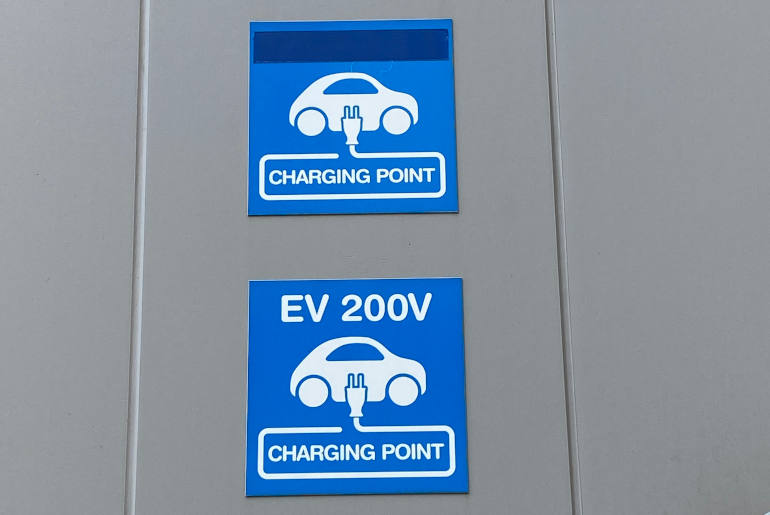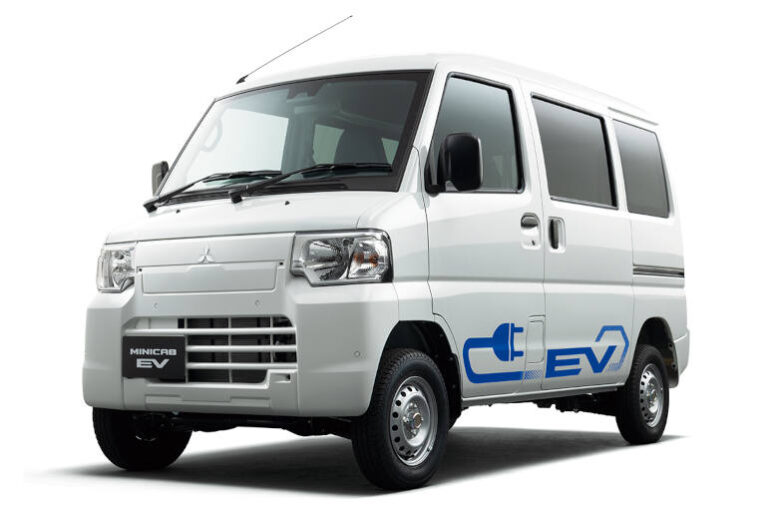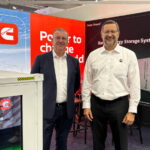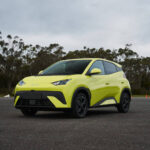At Geotab Connect 2025 in Orlando, Florida, Fleet EV News was introduced to eMotion Fleet, an emerging leader in fleet electrification solutions across Japan and the broader Asia-Pacific region. eMotion Fleet is on a mission to help fleet operators transition from diesel to electric by providing a fully integrated service that combines vehicles, charging infrastructure, electrification services, software, and telematics.
Shuji Shiraki, Founder and CEO of eMotion Fleet, launched the company with co-founder Dennis Ilic with the vision of supporting fleet operators through every stage of electrification—from planning and deployment to operational management. His company works with logistics providers, taxi fleets, bus operators, municipalities, airports, and seaports, offering tailored electrification solutions that optimise fleet performance.
A key element of eMotion Fleet’s approach is its partnership with Geotab. As an authorised Geotab reseller in Japan and Asia, eMotion Fleet integrates Geotab’s telematics technology into its EV fleet and energy management system, enabling fleets to track battery health, manage charging schedules, and optimise vehicle efficiency.
Japan’s Slow But Emerging EV Transition
Despite being home to automotive giants like Toyota, Nissan, and Honda, Japan has been slow to adopt electric vehicles (EVs). The EV penetration rate in Japan is only around 1.3%, significantly trailing behind Singapore (nearing 34%) and Thailand (14%). A major factor in this slow adoption is the dominance of hybrid vehicles and the limited availability of Japanese-made EVs.
However, demand for EVs is growing among fleet operators, particularly in last-mile delivery, public transport, and corporate fleets. EVs offer practical advantages such as lower floors for easier driver access, increased cargo capacity, and reduced maintenance costs. With Chinese and South Korean EV manufacturers entering the Japanese market, fleet operators are beginning to explore non-traditional brands for their electrification needs.
The Role of Telematics in Japan’s Fleet Industry
Fleet management in Japan has historically focused on GPS tracking and digital tachographs, with an emphasis on driver safety and compliance. However, as fleets begin electrifying, more advanced telematics solutions are required to track battery health, state of charge (SOC), and energy efficiency—data points that traditional telematics tools do not provide.
This is where eMotion Fleet’s partnership with Geotab becomes crucial. By integrating Geotab’s telematics solutions, eMotion Fleet offers fleets a comprehensive data-driven approach to monitoring and managing EV performance, ensuring optimal vehicle utilisation and charging efficiency.
Expanding Beyond Japan: eMotion Fleet’s Growth in Asia
While 80% of eMotion Fleet’s current focus is on Japan, the company has already begun expanding into Thailand, Malaysia, and Indonesia—markets where EV adoption is accelerating.
- Thailand is leading the region with an aggressive government target of 30% of vehicle production being electric by 2030.
- Malaysia and Indonesia are slower to electrify due to fuel subsidies, but as these subsidies decrease, the Total Cost of Ownership (TCO) for EVs is becoming more attractive.
- Fleet operators in Southeast Asia are increasingly interested in telematics solutions for fuel theft prevention, carbon credit tracking, and cost reduction.
While telematics adoption in these markets is still GPS-focused, there is growing demand for more advanced fleet management tools—a gap eMotion Fleet is poised to fill.
Future Plans
Although eMotionFleet is not yet active in Australia, Shiraki sees it as a key future market. Australia’s right-hand drive vehicle ecosystem aligns with eMotion Fleet’s current operations, and the country’s growing focus on EV adoption and sustainable fleet management presents an opportunity.
In his previous role as eLCV manufacturer Shiraki has previously engaged with major Australian fleet operators who have expressed interest in electric last-mile delivery solutions. However, resource allocation and strategic expansion remain key factors in determining when eMotion Fleet will enter the Australian market.
Japan’s fleet industry may be slow to electrify, but demand is growing—especially in logistics, public transport, and corporate fleets. With eMotion Fleet’s expertise in combining hardware, service, software, and telematics, the company is positioned to play a major role in Japan’s EV transition.

- Cummins signals next phase of its energy transition strategy with launch of BESS
 Cummins used All-Energy Australia 2025 to make a decisive statement about its long-term strategic direction. Known globally for its diesel engines, the company is now positioning itself as a diversified energy solutions provider—combining storage, renewables integration, hydrogen technologies, and advanced microgrid controls alongside its traditional generator products. For fleet operators, local government, utilities, mining and
Cummins used All-Energy Australia 2025 to make a decisive statement about its long-term strategic direction. Known globally for its diesel engines, the company is now positioning itself as a diversified energy solutions provider—combining storage, renewables integration, hydrogen technologies, and advanced microgrid controls alongside its traditional generator products. For fleet operators, local government, utilities, mining and - NSW Powers Up the Regions with 159 New EV Chargers
 The NSW Government’s latest regional charging announcement has landed with strong backing from the Electric Vehicle Council (EVC), marking one of the most significant expansions of public EV infrastructure in the state’s history. For fleet operators, councils, and businesses planning low-emission transport strategies, the rollout offers a clearer, more predictable path for electric vehicle travel
The NSW Government’s latest regional charging announcement has landed with strong backing from the Electric Vehicle Council (EVC), marking one of the most significant expansions of public EV infrastructure in the state’s history. For fleet operators, councils, and businesses planning low-emission transport strategies, the rollout offers a clearer, more predictable path for electric vehicle travel - An audience with Tim Washington at All Energy
 Tim Washington, Co-Founder and CEO of JET Charge, delivered a candid and forward-looking presentation on the realities of scaling EV charging infrastructure in Australia. Speaking with his characteristic openness, Washington reflected on the company’s 12-year journey—from early home-charging installations to today’s involvement in large-scale fleet, bus and truck electrification—and shared the lessons other businesses can use
Tim Washington, Co-Founder and CEO of JET Charge, delivered a candid and forward-looking presentation on the realities of scaling EV charging infrastructure in Australia. Speaking with his characteristic openness, Washington reflected on the company’s 12-year journey—from early home-charging installations to today’s involvement in large-scale fleet, bus and truck electrification—and shared the lessons other businesses can use - BYD ATTO 1 Lands Five-Star ANCAP Rating
 BYD has confirmed that its newest compact EV, the BYD ATTO 1, has achieved a maximum five-star ANCAP safety rating — a result that will immediately attract the attention of Fleet Managers, Sustainability Managers, and Finance Managers planning their next round of vehicle replacements. In a market where safety, efficiency, and affordability are all under
BYD has confirmed that its newest compact EV, the BYD ATTO 1, has achieved a maximum five-star ANCAP safety rating — a result that will immediately attract the attention of Fleet Managers, Sustainability Managers, and Finance Managers planning their next round of vehicle replacements. In a market where safety, efficiency, and affordability are all under - Leapmotor C10 Gets Smarter
 Leapmotor Australia has rolled out its latest complimentary over-the-air (OTA) software update for the C10, delivering new features that enhance safety, comfort, and connectivity across both Battery Electric Vehicle (BEV) and Range-Extender Electric Vehicle (REEV) models. Available to customers since 19 September, the update brings a suite of intelligent upgrades that continue Leapmotor’s commitment to
Leapmotor Australia has rolled out its latest complimentary over-the-air (OTA) software update for the C10, delivering new features that enhance safety, comfort, and connectivity across both Battery Electric Vehicle (BEV) and Range-Extender Electric Vehicle (REEV) models. Available to customers since 19 September, the update brings a suite of intelligent upgrades that continue Leapmotor’s commitment to











